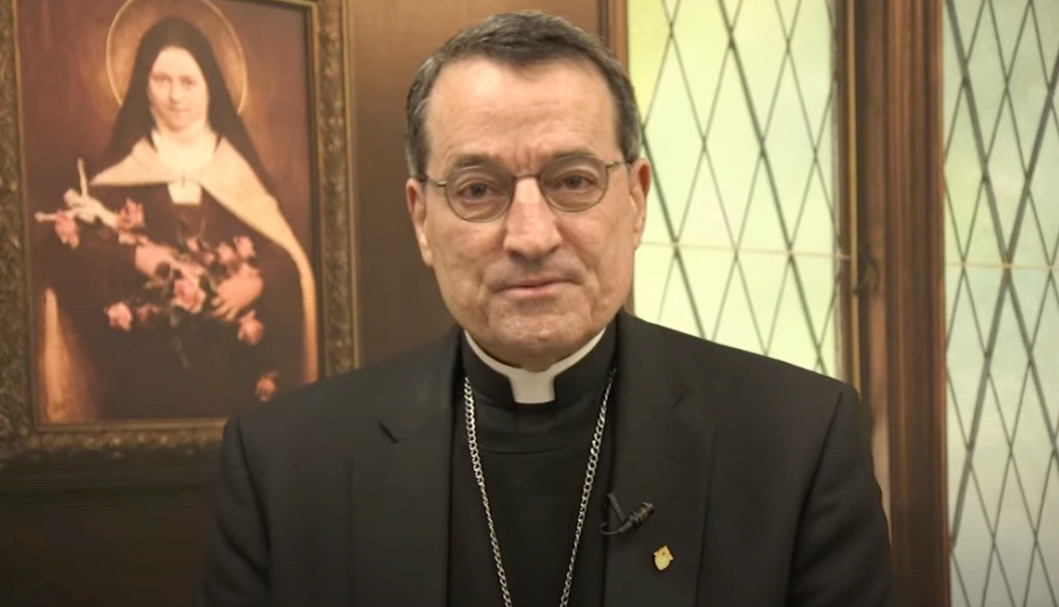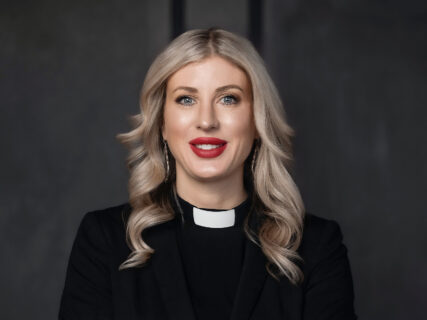Judge orders ICE to allow Catholics access to Chicago-area detention center

(RNS) — Cardinal Blase Cupich will celebrate an outdoor Ash Wednesday Mass and procession in solidarity with immigrant families hosted by the Coalition for Spiritual and Public Leadership, according to an announcement by the group Friday (Feb. 13). A day earlier, a judge ordered the U.S. Department of Homeland Security to grant the Christian advocacy group access to the Broadview detention center near Chicago to minister to detainees on Ash Wednesday, which begins the Christian season of Lent.
Yesenia Rivera, a spokesperson for the group, told RNS that the group could not confirm whether Cupich would be present for its Ash Wednesday ministry inside Broadview.
On Thursday, U.S. District Judge Robert Gettleman wrote in his preliminary injunction, “The court finds that the government has substantially burdened plaintiffs’ exercise of religion.”
The Rev. Dan Hartnett, a Jesuit priest who is part of the coalition’s clergy council and who was a plaintiff on the legal complaint, said in a statement, “As Lent begins, we pray this ruling restores religious freedom for those detained and moves our country closer to justice in honoring the dignity of all migrants.”
CSPL, which describes itself as a “Catholic and Christian” group merging liberation theology and community organizing, did not allege that DHS was violating detainees’ rights to practice religion, instead arguing that their own rights to perform ministry were violated, citing the First Amendment, the Religious Freedom Restoration Act of 1993 and the Religious Land Use and Institutionalized Persons Act of 2000.
Gettleman, an appointee of President Bill Clinton, noted that DHS failed to argue that exceptions from the Religious Freedom Restoration Act applied, such as showing that the burden on exercising religion furthered “a compelling government interest” and that it was the least restrictive way to further that interest. DHS also did not argue that its policy was within the public interest.
DHS did not deny the coalition’s allegations that it had erected a fence around the facility last fall that kept the group from praying on facility grounds or that the department had denied the group access to enter Broadview and minister to detainees. DHS also did not dispute ordering “that no prayer is allowed on federal property on or in the Broadview facility.”
DHS did not immediately respond to a request for comment.
“As plaintiffs note, Broadview allowed plaintiffs’ religious visitation to Broadview for years before reversing course relatively recently,” wrote Gettleman. “With reasonable notice and communication, addressing legitimate security and safety concerns, allowing plaintiffs to provide pastoral care to migrants and detainees does not pose any undue hardship on the government.”

Gettleman said that CSPL must be allowed to offer ashes and Communion on Ash Wednesday to the detainees at Broadview who want to participate and that the group must meet with DHS to make a security plan for the Ash Wednesday services. The judge also ruled that federal officials must meet to discuss religious ministry after Ash Wednesday, including CSPL’s ability to have personal interactions with detainees and to be able to engage in prayer inside and outside the facility.
In a press release Friday, CSPL said it was “awaiting final confirmation from the Department of Homeland Security regarding logistics to comply with the court’s order.”
While the group did not definitively say whether Cupich would be joining them in Broadview ministry, it did announce that the cardinal would be with CSPL for an evening Mass at Our Lady of Mount Carmel Catholic Church and a peaceful procession afterward.
In recent weeks, Cupich, one of the most influential clerics in the U.S. because of his close ties to the Vatican, has told several interviewers that his priests had been stopped by federal agents and asked to prove their immigration status “because of their color.”
Last year, CSPL members gathered at Immigration and Customs Enforcement’s downtown Chicago headquarters for Ash Wednesday, but their push to minister to detainees significantly accelerated in the fall, after federal immigration enforcement agencies launched a surge known as Operation Midway Blitz and after a local resident, Silverio Villegas González, was shot and killed by ICE agents.
Since then, the group says their processions and Masses have drawn thousands, including a Mass celebrated outside Broadview last year for the Day of the Dead, led by Chicago Auxiliary Bishop José María Garcia-Maldonado, himself an immigrant from Jalisco, Mexico.
While Cupich and Chicago’s auxiliary bishops are sometimes seen as occupying the relative left of the fairly conservative U.S. church, several prelates to their right have raised concerns about the denial of access to detention facilities to provide the sacraments and pastoral care.
In an interview released Thursday, the U.S. Conference of Catholic Bishops’ committee chair for religious liberty, Portland Archbishop Alexander Sample, told Catholic News Service that “the most concerning” religious liberty issue within immigration is that lack of access.
“There have been some difficulties there in some places, and so we’re keeping a very close eye on that to make sure that the religious rights of those in the detention centers are protected so that they can receive pastoral care and especially the sacraments from the church’s ministers,” Sample, often considered to be among the most conservative U.S. prelates, said.
Former religious liberty chair Bishop Kevin Rhoades of the Fort Wayne-South Bend Diocese in Indiana, who is an adviser to President Donald Trump’s Religious Liberty Commission, and Winona-Rochester, Minnesota, Bishop Robert Barron, a member of the commission, both expressed concern about access to the sacraments in detention centers last November.
Sample, who met with Pope Leo XIV on Monday, said the pope feels “very strongly” about supporting immigrants in the U.S.
Sample also expressed support for immigration reform. “We have a system that isn’t working. But in terms of the folks that are already here, and especially when I think of the people in my own archdiocese who have been here sometimes for years and years and have established themselves, there has to be a more just, more humane, just a better way to go about this,” he said.
Jack Jenkins contributed to this report.


